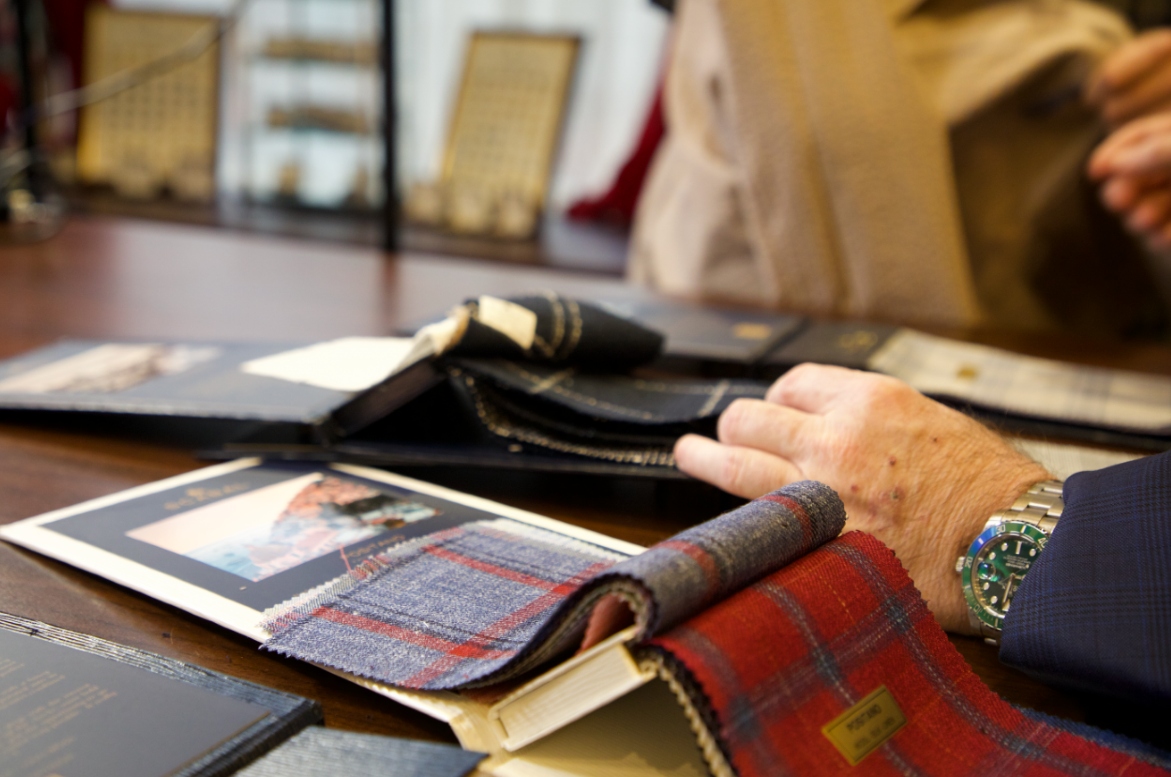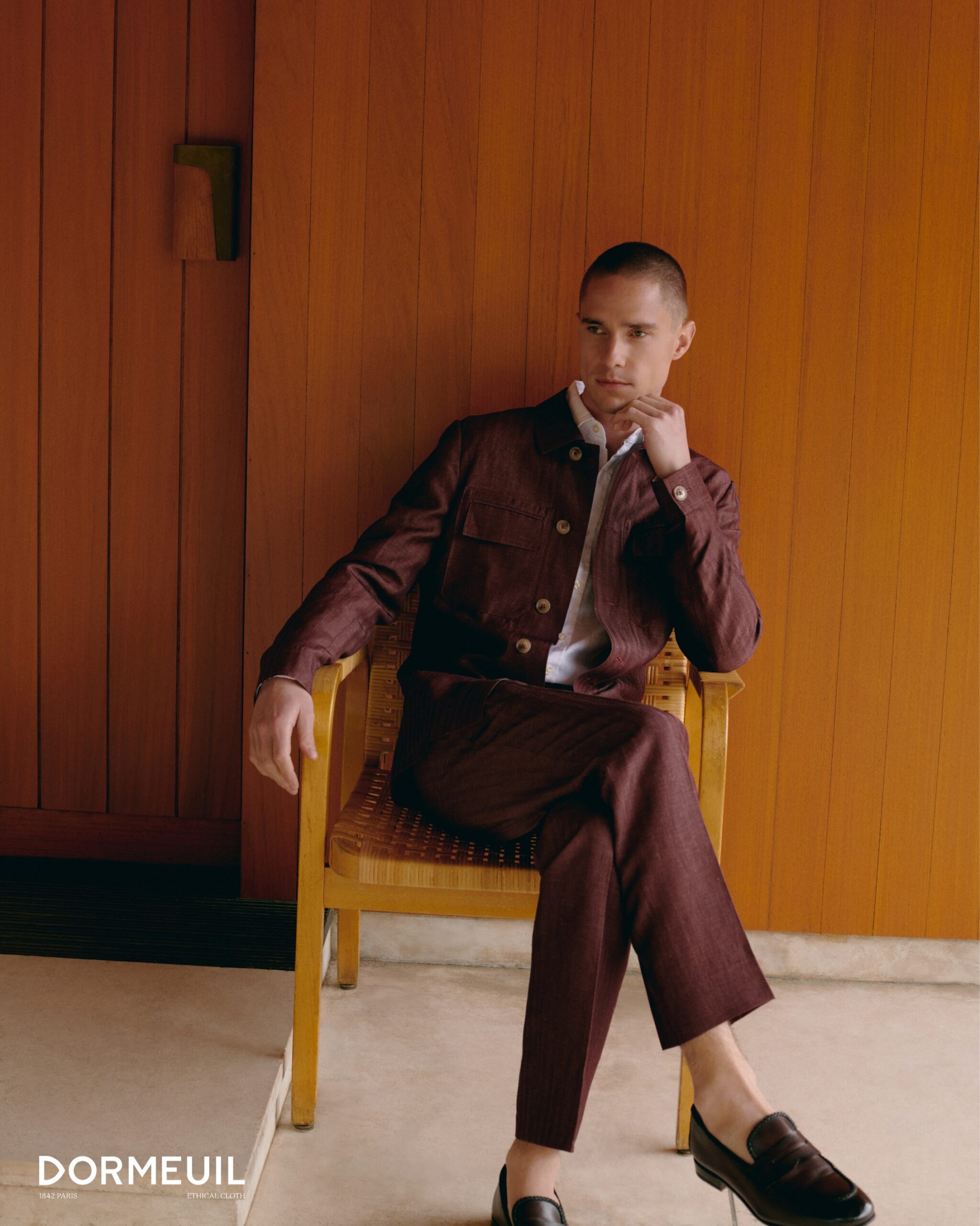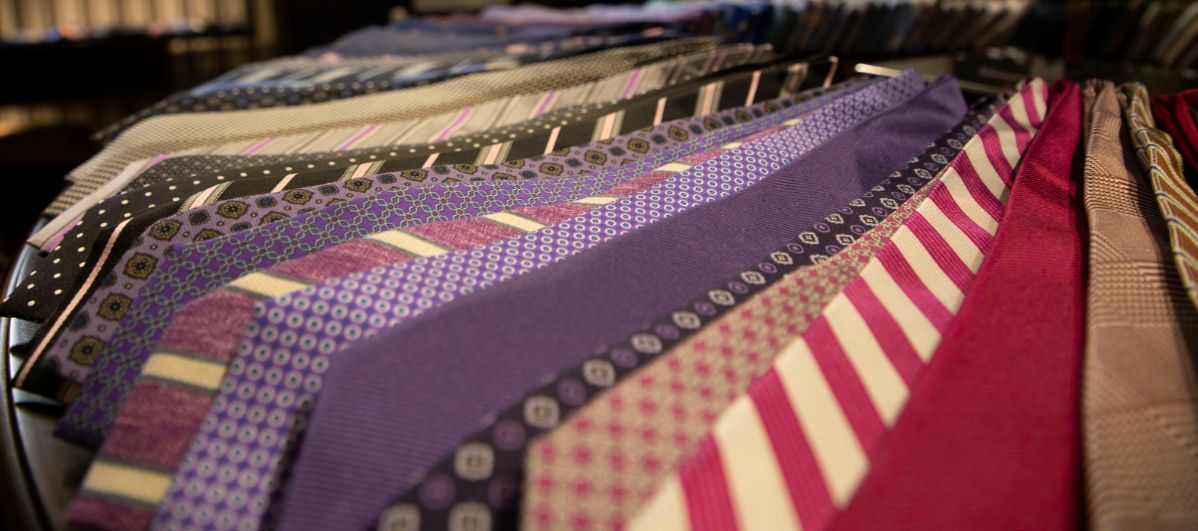If you’ve started looking into custom suits in Philadelphia, you’ve probably seen prices ranging from the low thousands into the five-figure range. Why the variation? At the end of the day, the cost of a custom suit comes down to three key factors: construction, fabric, and custom details.
Let’s break down each driver so you can understand what you’re paying for—and decide which approach best suits your needs.
Construction: Made-to-Measure vs. Bespoke
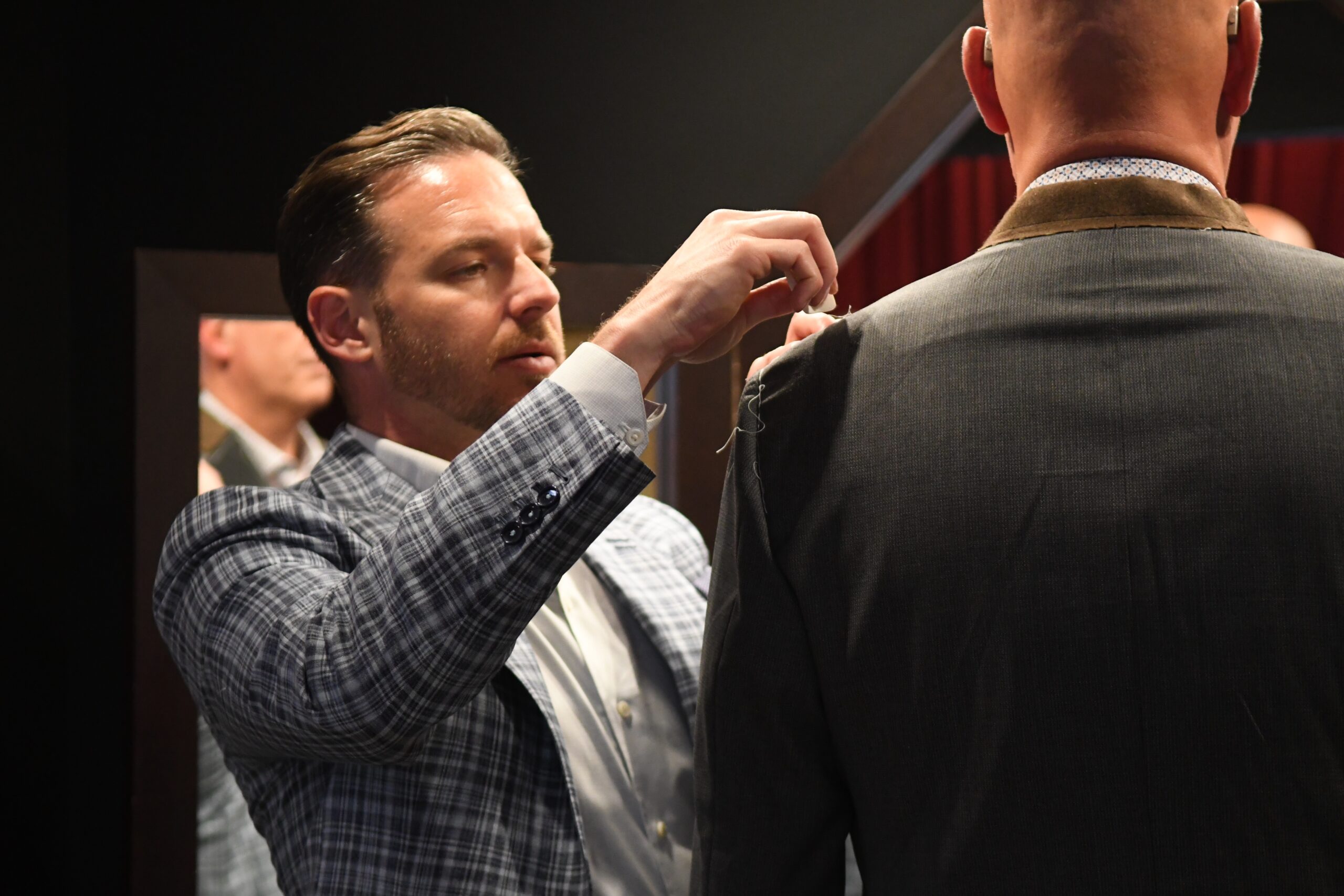
When we talk about construction in tailoring, we’re referring to how the suit is built from the ground up—the process that takes your measurements and turns them into a three-dimensional garment. This includes whether the suit is cut from an existing block pattern or drafted as a brand-new pattern just for you, the number of fittings involved, and how much of the work is done by hand versus machine.
Construction is the single biggest driver of cost in custom tailoring. It determines not only how long your suit will take to make, but also how precisely it will fit and how much hand craftsmanship goes into the final product.
Made-to-Measure (MTM): $2,000 – $3,000
MTM begins with a base pattern that is adapted to your body measurements. Think of it as a high-level modification: the framework already exists, but it’s tailored to your dimensions, preferences, and chosen style.
-
Customization: You’ll enjoy the full spectrum of design options—fabrics, linings, lapels, vents, and more.
-
Timeline: Typical turnaround is 6–8 weeks with just one fitting before delivery.
-
Fit: While MTM doesn’t sculpt to your body as precisely as bespoke (since it starts from a pre-existing block), our in-house finishing process molds the garment to your unique shape. The result is a sharp, highly personalized suit with an efficient production schedule.
Bespoke: $3,500 – $6,000+
Bespoke is the highest expression of tailoring, and the process is far more in-depth. Instead of adapting an existing template, a paper pattern is drafted from scratch, based entirely on your measurements, posture, and stance. This personal blueprint is then refined through multiple fittings until the garment achieves a sculpted, second-skin fit.
-
Craftsmanship: Bespoke garments feature significantly more handwork—hand-padded lapels, hand-set sleeves, and subtle shaping that no machine can replicate.
-
Exclusivity: At Henry A. Davidsen, we work with one of only two Grade Six bespoke makers in the United States, a designation that represents the pinnacle of tailoring expertise.
-
Timeline: First-time clients should plan for 10–12 weeks, which includes basted or muslin fittings. Once your personal pattern is established, repeat orders shorten to 5–6 weeks—as efficient as MTM, but with the artistry of bespoke.
Fabric: Mills and Material Choices
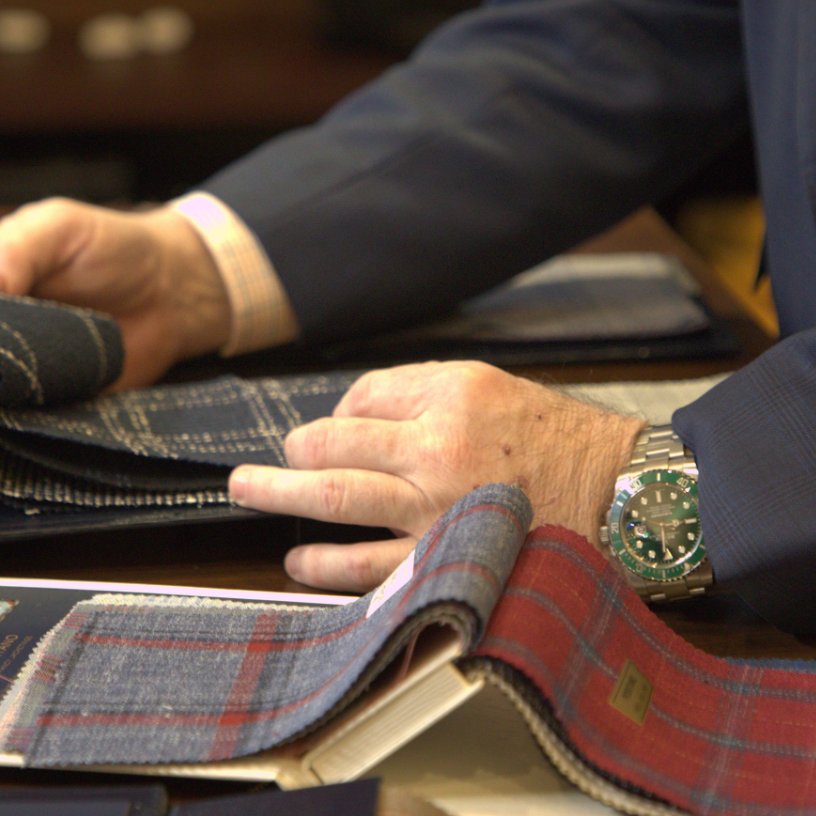
If construction is the skeleton of your suit, fabric is its skin—the element you feel every time you put it on and the first thing others notice. Fabric selection is the second major driver of cost, and it plays a defining role in the comfort, drape, and personality of your garment.
Wool Super Counts
Most suiting fabrics are made of wool, and their quality is often expressed in “Super” numbers (Super 100s, 120s, 150s, and so on).
-
Lower Super Counts (100s–120s): More durable and resilient, making them ideal for everyday business wear. They hold their shape longer and stand up to frequent use.
-
Higher Super Counts (130s–180s): Lighter, finer, and softer to the touch, with a luxurious feel. They are more delicate, however, and best suited for special-occasion garments.
Choosing a Super count is a balance between durability and refinement, and it directly impacts price.
Luxury Blends
Beyond wool, fabric houses offer blends that elevate texture and seasonal performance:
-
Cashmere: Adds softness and warmth, often found in fall/winter collections.
-
Silk: Introduces sheen and lightness, common in eveningwear.
-
Linen: Breathable and casual, perfect for summer weddings or travel suits.
-
Mohair: Provides crispness, resilience, and a subtle sheen, often chosen for tuxedos.
These blends are more complex to weave, which drives their premium price points.
Mill of Origin
Fabric costs are also influenced by where the cloth is woven. World-renowned mills like Loro Piana, Scabal, Holland & Sherry, Dormeuil, and Ermenegildo Zegna are synonymous with heritage, innovation, and consistency. When you invest in these fabrics, you’re not just paying for the material itself—you’re buying into centuries of expertise and a guarantee of quality.
Special Collections
Many mills also release limited-edition or seasonal collections that highlight rare fibers, exclusive patterns, or experimental weaves. Examples include:
-
Heritage Archives: Re-issues of historic patterns and weaves.
-
Rare Fiber Collections: Featuring blends with vicuña, guanaco, or pure cashmere.
-
Seasonal Editions: Fabrics designed specifically for summer breathability or winter insulation.
These collections are produced in smaller runs, making them more exclusive and, naturally, more expensive. For clients who want something truly distinctive, they represent the opportunity to own a suit that’s as rare as it is refined.
Custom Details: The Finishing Touches
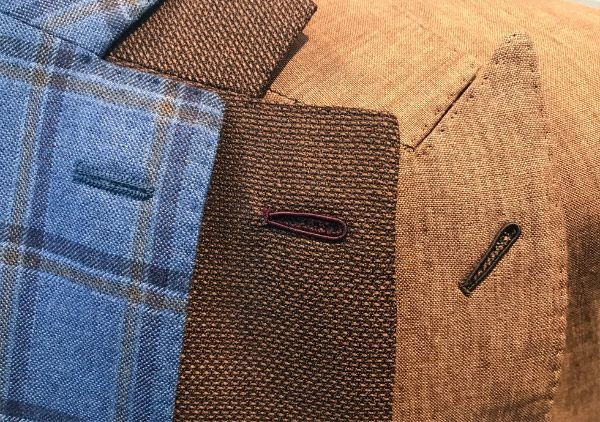
Finally, price varies based on the level of personalization in your design details. While every custom suit includes options for lapels, vents, and button stance, more intricate details can add cost:
-
Specialty Linings: From silk jacquards to personalized prints.
-
Buttons: Genuine horn, mother-of-pearl, and metal buttons are pricier than standard plastic.
-
Stitching & Detailing: Hand-sewn pick stitching, surgeon’s cuffs (working sleeve buttonholes), monogramming, and other artisanal touches require more time and skill.
These aren’t necessary for a well-made suit, but they’re often what transforms a garment from “custom” into something uniquely yours.
Final Thoughts
The cost of a custom suit in Philadelphia is shaped by three main factors: construction, fabric, and details. Expect to invest $2,000–$3,000 for Made-to-Measure or $3,500–$6,000+ for Bespoke, with fabric selection and finishing touches determining where you land within those ranges.
At Henry A. Davidsen, our goal is to make the process transparent and empowering—so you can choose the path that best fits your lifestyle, timeline, and wardrobe goals.
👉 Request a Consultation to learn more about your options and start designing a suit that’s truly your own.
